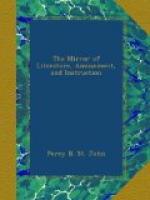I speak not—I trace not—I
breathe not thy name,
There is grief in the sound—there
were guilt in the fame,
But the tear which now burns on my cheek
may impart
The deep thought that dwells in that silence
of heart.
Too brief for our passion, too long for
our peace,
Where those hours can their joy or their
bitterness cease,
We repent—we abjure—we
will break from our chain,
We must part—we must fly to—unite
it again.
Oh! thine be the gladness and mine be
the guilt,
Forgive me adored one—forsake
if thou wilt,
But the heart which I bear shall expire
undebased,
And man shall not break it—whatever
thou mayest.
And stern to the haughty—but
humble to thee,
My soul in its bitterest blackness shall
be;
And our days seem as swift—and
our moments more sweet
With thee by my side—than the
world at our feet.
One sigh of thy sorrow—one
look of thy love
Shall turn me or fix, shall reward or
reprove;
And the heartless may wonder at all we
resign,
Thy lip shall reply not to them—but
to mine.
Many of the best poetical pieces of Lord Byron, having the least amatory feeling, have been strangely distorted by his calumniators, as if applicable to the lamented circumstances of his latter life.
The foregoing verses were written more than two years previously to his marriage; and to show how averse his lordship was from touching in the most distant manner upon the theme which might be deemed to have a personal allusion, he requested me the morning before he last left London, either to suppress the verses entirely or to be careful in putting the date when they were originally written.
At the close of his lordship’s injunction, Mr. Leigh Hunt was announced, to whom I was for the first time introduced, and at his request I sang “O Marianne,” and this melody, both of which he was pleased to eulogize; but his lordship again observed, “Notwithstanding my own partiality to the air, and the encomiums of an excellent judge, yet I must adhere to my former injunction.”
Observing his lordship’s anxiety, and fully appreciating the noble feeling by which that anxiety was augmented, I acquiesced, in signifying my willingness to withhold the melody altogether from the public rather than submit him to any uneasiness. “No, Nathan,” ejaculated his lordship, “I am too great an admirer of your music to suffer a single phrase of it to be lost; I insist that you publish the melody, but by attaching to it the date it will answer every purpose, and it will prevent my lying under greater obligations than are absolutely necessary for the liberal encomiums of my friends.”
IN THE VALLEY OF WATERS.
In the valley of waters we wept o’er
the day
When the host of the stranger made Salem
his prey,
And our heads on our bosoms all droopingly
lay,
And our hearts were so full of the land
far away.




